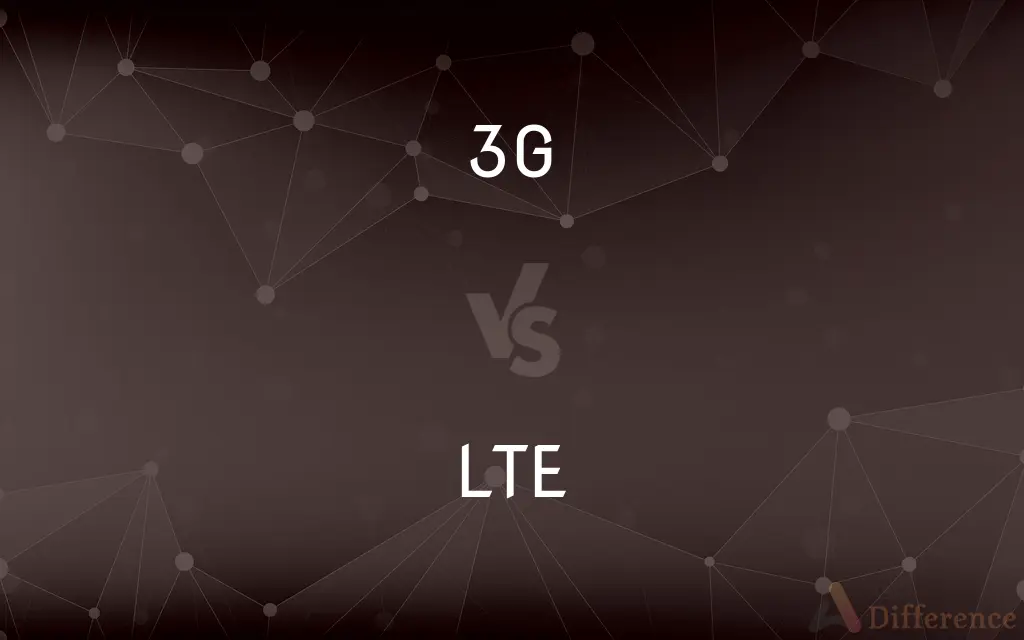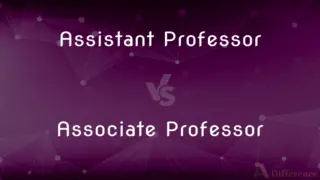3G vs. LTE — What's the Difference?
By Fiza Rafique & Maham Liaqat — Published on March 5, 2024
3G stands for the third generation of mobile telecommunications technology, offering slower data speeds. LTE (Long-Term Evolution) is a standard for wireless broadband communication, providing faster speeds and improved network efficiency over 3G.

Difference Between 3G and LTE
Table of Contents
ADVERTISEMENT
Key Differences
3G technology marked a significant advancement in mobile communications by introducing higher data speed capabilities than its predecessors, enabling mobile web browsing, video downloading, and GPS services. It provided the foundation for the mobile internet and multimedia services that became integral to modern smartphones.
LTE, considered a precursor to 4G technology, significantly surpasses 3G in terms of data transmission speeds and network efficiency. LTE offers enhanced user experiences, supporting high-definition video streaming, high-speed mobile internet access, and real-time data sharing with improved latency over 3G networks.
The transition from 3G to LTE represented a leap in technology that enabled more robust mobile applications, including streaming media, web access, and voice over IP (VoIP) services. LTE's architecture redesign aimed at increasing network capacity and efficiency, facilitating the growth of mobile internet usage and the Internet of Things (IoT).
3G networks are based on a mix of technologies that include CDMA, UMTS, and HSPA, whereas LTE standardizes this approach, using a simplified, IP-based network architecture. This standardization has allowed for easier and more cost-effective network upgrades and maintenance, further pushing the adoption of LTE globally.
The shift from 3G to LTE not only brought about faster internet speeds but also impacted how telecommunications infrastructure was built, emphasizing the need for higher bandwidth and lower latency to accommodate the surge in data consumption and the number of connected devices.
ADVERTISEMENT
Comparison Chart
Speed
Up to 2 Mbps
100 Mbps or more
Technology Basis
Mix of CDMA, UMTS, HSPA
Simplified, IP-based network
Primary Benefit
Mobile web browsing, basic video streaming
High-definition video streaming, high-speed internet, low latency
Network Efficiency
Less efficient, higher latency
More efficient, lower latency
Evolution
Introduced mobile internet and services
Paved the way for 4G and enhanced broadband services
Compare with Definitions
3G
Marked the beginning of the smartphone era.
Smartphones became popular with the advent of 3G.
LTE
A high-speed wireless communication standard for mobile devices.
LTE significantly reduced my video buffering times.
3G
Offers moderate internet speeds.
Downloading apps over 3G can take several minutes.
LTE
Allows for real-time data services and streaming.
I stream high-definition movies on my phone using LTE.
3G
Enabled video calls and streaming services.
I watched live sports on my phone via 3G.
LTE
Enhances the capacity and efficiency of mobile networks.
LTE networks handle more users simultaneously without slowing down.
3G
Supports voice calls and SMS in addition to data.
I used 3G to send pictures while talking on the phone.
LTE
Acts as a bridge to 4G technologies.
LTE was my phone's first step into 4G speeds.
3G
A technology standard for mobile phones, supporting web browsing and email.
The 3G network allowed me to check my email on the go.
LTE
Supports faster download and upload speeds.
Uploading videos to social media is quicker with LTE.
Common Curiosities
What does 3G stand for?
3G stands for the third generation of mobile telecommunications technology.
Is LTE the same as 4G?
LTE is often marketed as 4G, but true 4G requires higher speed standards than LTE; however, LTE is a significant step towards 4G.
How much faster is LTE compared to 3G?
LTE can be 10 times faster or more, depending on network conditions and the specific technologies used.
Can a 3G phone work on an LTE network?
A 3G phone can connect for basic services but won't achieve LTE speeds or efficiency.
What is LTE?
LTE stands for Long-Term Evolution, a standard for wireless broadband communication.
Do I need a new SIM card for LTE?
Depending on your carrier and phone, you might need a SIM card that is compatible with LTE networks.
Are LTE services more expensive than 3G?
Pricing depends on the carrier, but with higher data consumption, LTE plans can be more expensive.
How does LTE improve mobile internet?
LTE offers higher speeds, lower latency, and more reliable connections, enhancing overall mobile internet experiences.
What happens to 3G networks as LTE expands?
Many carriers are phasing out 3G networks to repurpose the spectrum for LTE and 5G technologies.
Why is the switch from 3G to LTE significant for users?
The switch offers users faster, more reliable internet access, supporting a wider range of applications and services.
What's the future of LTE with the rise of 5G?
LTE will coexist with 5G, serving as a backbone and providing coverage where 5G is not available.
Why is LTE more efficient than 3G?
LTE uses a simplified, IP-based network architecture, improving data transmission efficiency and reducing latency.
Is LTE available everywhere?
LTE coverage has expanded globally but may vary depending on location and carrier.
How does LTE affect battery life?
LTE can consume more battery due to higher data rates, but advancements in technology are mitigating this issue.
Can LTE be used for voice calls?
Yes, through VoLTE (Voice over LTE), offering clearer audio and faster call setup times.
Share Your Discovery

Previous Comparison
Dim sum vs. Dumpling
Next Comparison
Assistant Professor vs. Associate ProfessorAuthor Spotlight
Written by
Fiza RafiqueFiza Rafique is a skilled content writer at AskDifference.com, where she meticulously refines and enhances written pieces. Drawing from her vast editorial expertise, Fiza ensures clarity, accuracy, and precision in every article. Passionate about language, she continually seeks to elevate the quality of content for readers worldwide.
Co-written by
Maham Liaqat















































